#caption is from marlowe's doctor faustus :-)
Text
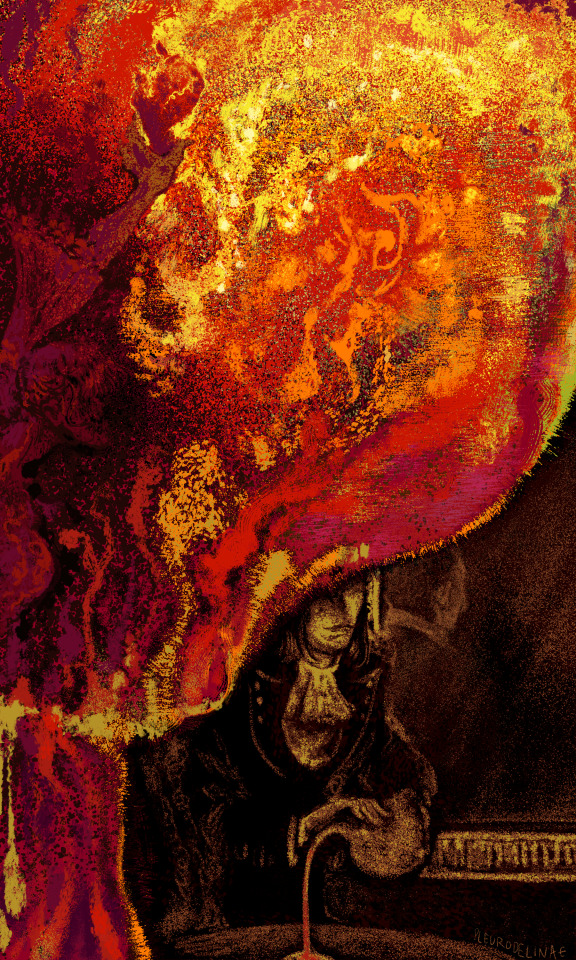
nothing so sweet as magic is to him, which he prefers before his chiefest bliss
#umineko#umineko when they cry#umineko no naku koro ni#kinzo ushiromiya#ronove#beatrice the golden witch#ronoue genji#newt art#caption is from marlowe's doctor faustus :-)
108 notes
·
View notes
Note
Hi! Non-native speaker, so I hope my English is not that bad. I really like your blog and especially your analyses on Mephisto. Fantastic!(read in his voice)
So my question.Have you read blue exorcist novel Bloody Fairy Tail? In the novel there is a part where little girl describes Mephisto as big void and the black wing towering over him. Do you think this could be a hint to his real form? Or perhaps his role as Angel of Death? Also there is part in the first chapters of the manga, when Mephisto meets with Amaimon and tells him that he took Rin under his wing. It might be just a translation though. Sorry for a long ask
After accidentally deleting this twice I’m going to try again! (New phone, still getting used to it)
I have not actually read the entire thing because finding any of the light novels in the US is really, really hard. Like, really hard. But I have actually read the part you’re talking about through fan pages here on Tumblr talking about that very thing! (And thanks to @facets-and-rainbows I’ve now been able to read more! Thank you.)
Here’s the thing: the only image that exists that depicts Mephistopheles in his pre-Goethe form is this one by Eugene Delacroix from the early 1800’s:
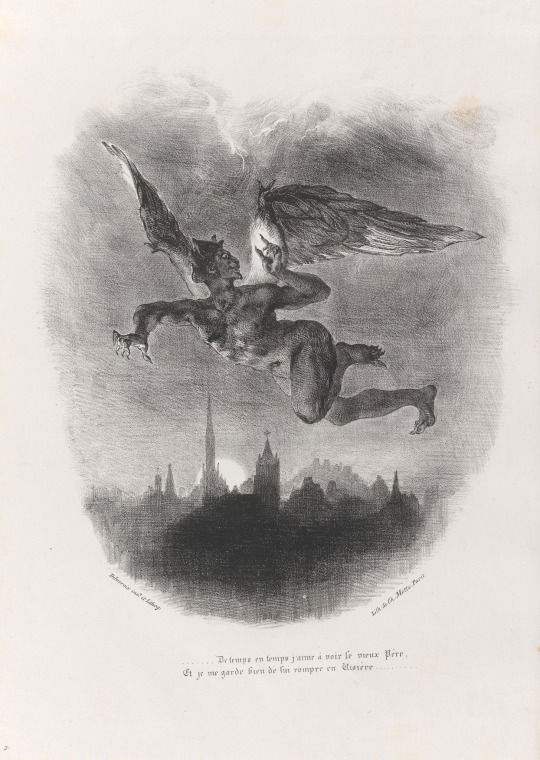
This version of Mephistopheles is from Marlowe’s 1616 version, The Tragical History of the Life and Death of Doctor Faustus. In it, (the B version) Mephistopheles is said to conjure wings in order to frighten the knights attacking him and Faustus, before turning said knights into demons (or animals in some translations) and giving them horns.
Mephistopheles is also a fallen angel, and uses that to both dissuade Faustus from forming a contract at the beginning, and later to help trick and torment the Pope in this version.
The inscription on it reads: De temps en temps j’aime a’voir le vieux Pére, Et me garde bien lui rompre en Visiére
Which roughly translates to (keeping in mind I’m still learning how to read older dialects of French) : “From time to time I like to see my old/winterly/ancient Father, and take care not to break off/sever with him in Person.” The caption probably is talking about the Pope scene, or maybe Faustsus’ separation from God, but to me it also speaks to the retribution of both.
Aaaaaanyway point is, it’s very popular to depict Mephistopheles as having black, feathery wings, partly because no matter what version he’s in he’s still a fallen angel lamenting his separation from God, (which isn’t especially relevant but it IS interesting) and also because the wings are mentioned directly in the earliest published version of the play.
What’s more, the original Mephistopheles from the late 1500’s (earliest record of the name was 1587) in the original Faustbuch was never a demon at all, but rather either an angel or a man that had been damned to serve Lucifer for all eternity by selling him his own soul, the reasons for which are never revealed. He does, however, from the very beginning, warn Faust about what he’s doing, and what that will lead to, presumably because he’s done the same thing and now regrets it. Fun stuff :)
As to whether I think it has anything to do with his true form, I would say yes, to a point. Samael is a shape-shifter after all, so not too many forms are out of bounds.
However, if he has wings (probable or at least possible) there’s some kind of reason why he doesn’t use them.
These are the closest we ever see to a demon form for him, and he’s… pretty formless, broadly speaking.
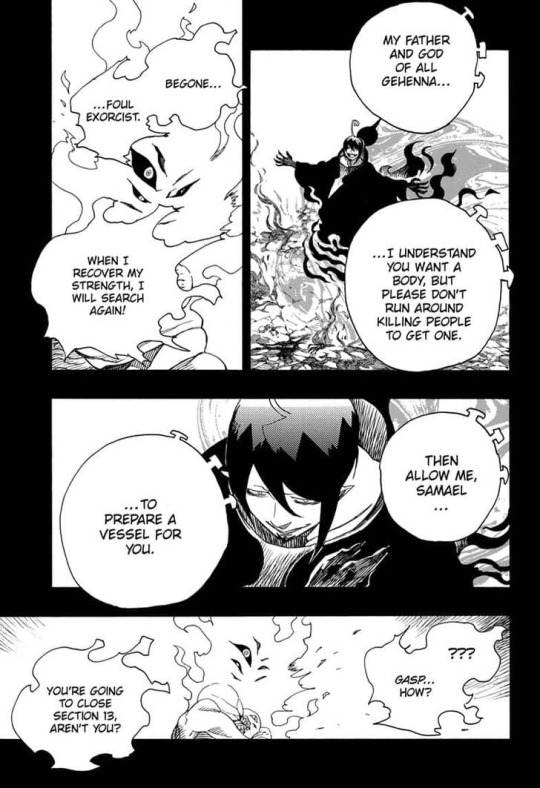
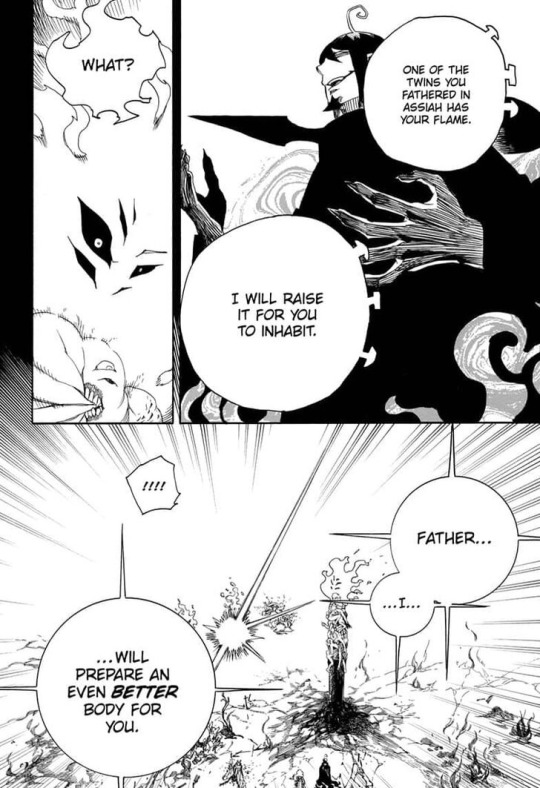
He is kind of void-like, true, and warps the space around him. But, no visible wings.
In fact the only wings we see him with are not his own - they’re that of his familiar, which is likely Kin of Azazel.
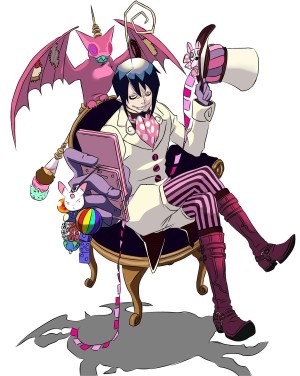
He can fly without any wings at all, (space timey levitation and all) so one would question why he’d need a familiar’s, never mind his own. Conservation of energy perhaps?
In any case I do think he CAN have wings, when he wants them, if that makes sense. Shape shifting is however tiresome, and flight requires a great deal of energy expenditure even if he’s not working against gravity in the traditional sense. So I imagine that he could use his own wings, or turn into a bird, but he doesn’t do so unless practical because it eats up his stamina, which he’s got little of comparatively.
Though honestly I’m more of the mind that he does shape shift all the time to observe things, (and what better form than a bird? He’s called The Raven too to boot) it’s just that turning into anything like that is going to terrify people, and unless that’s his aim, it’s not terribly reasonable. Similarly I am completely sure he has horns and a tail, but those things are very secretive to him, so he doesn’t show them hardly ever.
Why the girl sees wings may just be a reflection of her own fears; humans see what they want to, and fear-projecting wings into a creepy demonic aura would not be beyond a child.
As to why they might be secret, they’re probably very identifiable. In his current incarnation he thrives on secrecy and keeping his name, and infamy, on the down-low. He’s not trying to give Lucifer any more shit to throw back in his face, and he’s not trying to be a god and rule over people (not directly) he’s just trying to be a chairman and an arc knight keeping the world from literally gong up in flames, but doing so as close to anonymously as possible for himself. He doesn’t want people to fear him in the same way they used to (except when he wants them to of course) he just wants to do his own thing, and pretty much be left alone.
Not to get too speculative here, but I think perhaps he’s tired. Tired of being a god. Tired of being a demon. Tired of being Lucifer’s favorite scapegoat. (The irony of that) Tired of having to be a puppeteer and tired of having to serve the needs of others in order to just keep himself alive and sane. Tired of playing politics with Lucifer and tired of him never changing or being able to.
And who could blame him? Over and over and over and over. The monotony and pain are unimaginable. Perhaps that’s why Lucifer can’t understand him; surely if anyone could appreciate the suffering that comes from eternity and the pain of losing out over and over, it would be him, surely? Yet, Samael perseveres. He finds the smallest, most difficult things to cling to, like a desperate man panning for gold in a sea of sand, looking for specs of dust. He lives solely for those little moments, the butterfly wing that shapes a hurricane on the other side of the world. It’s monotonous, it’s tedious and it sucks, but rarely, ever rarely, it’s worth it. The world will never see perfection and he likes it that way - he doesn’t want perfection, only change.
And change is probably what drives his secrecy. He changes his face to suit the time, and in a time when demons supposedly don’t exist it makes sense to be discreet. There’s also advantages to the relative anonymity; if he does have to ever throw his weight around, he has to do far less to make a deep impression.
Thanks for the ask. I enjoyed answering even if I went a little off topic lol.
47 notes
·
View notes
Video
youtube
Christopher "Kit" Marlowe was an Elizabethan playwright, friend of William Shakespeare, and a gay atheist spy. Let's talk about that.
(video does have closed captions)
Full text transcript below the cut
Hello everyone! Let’s talk about Christopher Marlowe being super gay.
For those of you who don’t know: Christopher “Kit” Marlowe was an Elizabethan poet and playwright, and contemporary, rival, possibly collaborator and friend of William Shakespeare. He was born the same year as Shakespeare, in fact, but only lived to be 29, when he was stabbed to death.
He was a huge influence on Shakespeare, inspiring him to use Blank Verse in his plays. and Some people have even suspected Marlowe of writing, or at least co-writing, some of Shakespeare’s early plays. Marlowe and Shakespeare were close enough that many scholars think Mercutio, in Shakespeare’s Romeo and Juliet, is based off Marlowe as a sort of tribute to the man after he died. If you like Shakespeare’s work, I highly recommend Marlowe. His most well known works are Doctor Faustus, which my personal favorite, Edward the Second, and The Jew of Malta.
He was also a spy for the crown, probably, and was accused of being an atheist and super gay.
Caveat: a few months ago, I made a video about Shakespeare being pretty damn bisexual. I said this then, but it bears repeating now: discussing the sexual orientation of historical figures can be tricky. Modern terms and understandings of sexuality and sexual orientation are modern. The way we view and contextualize sexuality is very dependant on our place in history. If you were to ask Marlowe if he was gay, he wouldn’t have really known what you meant by that.
Also, People in our culture tend to view Heterosexuality as the default, that in the absence of evidence, people are assumed straight. We are going to try to work against this. What evidence is there for Marlowe’s sexuality at all, straight or otherwise, and why might that lead us to believe that he is, well, decidedly not straight.
So, let’s talk about Kit Marlowe and how he was, maybe, probably, a gay atheist spy as well as one of England’s greatest playwrights.
Born in Canterbury in 1564, he went to Corpus Christi University in Cambridge as a young man. During this time he has several long absences from school, and spent way more money on food than his scholarship funds would have allowed. He almost didn’t graduate because of all his absences in fact, but was given his degree after the Privy Council sent the University a letter saying that he had been engaged in unspecified "affaires" on "matters touching the benefit of his country". This letter, combined with his unexplained source of income, has led many to think he was...well, a crown spy. Which is pretty great.
After college, Marlowe seems to have dedicated himself fulltime to his writing. In 1593 though, Marlowe was accused of heresy and atheism. He was never put on trial as he was stabbed to death 10 days later. Why he was stabbed is a point of debate. It might have just been a fight over a bar tab, but other far more sensationalist explanations have been suggested over the years, including that he was murdered to cover up some spy secrets or to keep him from naming others in the government as atheists.
Marlowe never married. He never had children. As far as we can tell, he never had any serious relationships with any women. Part of that might just be that he was a very busy man, writing all those plays and being an...atheist spy for the government.
However, we have...some pretty good reasons to think Marlowe was gay and it's a pretty well accepted theory in some scholarly circles. We’re going to look at two broad sources: Marlowe’s writings and things his contemporaries, especially Richard Baines, said about him.
Now. It’s important to not ascribe too much biographical reading to fictional works. Straight men CAN write about gay themes of course, though...I would argue that it really isn’t that common. And Marlowe wrote about gay themes….like...a lot. Far more explicitly than Shakespeare ever did.
In Hero and Leander, Marlowe writes of the male youth Leander, "in his looks were all that men desire" and that when Leander is swimming, the sea god Neptune becomes really...turned on, and interested in him "imagining that Ganymede, displeas'd, had left the Heavens ... the lusty god embrac'd him, call'd him love ... He watched his arms and, as they opened wide at every stroke, betwixt them would he slide and steal a kiss, ... And dive into the water, and there pry upon his breast, his thighs, and every limb, ... and talk of love",
Edward the Second, a play that explores the homosexual relationship between Edward and Piers Gaveston, and Edward’s reign as king, and eventual fall as a monarch, is a very sympathetic view of the historical figure and contains the following passage supporting homosexual relationships:
The mightiest kings have had their minions;
Great Alexander loved Hephaestion,
The conquering Hercules for Hylas wept;
And for Patroclus, stern Achilles drooped.
And not kings only, but the wisest men:
The Roman Tully loved Octavius,
Grave Socrates, wild Alcibiades.
Marlowe’s play “Dido, Queen of Carthage” begins with a scene of the God Jupiter fawning over Ganymede. There’s...a lot of good quotes from this scene, since it’s basically just a lot of flirting before Venus shows up and There’s lots of “Come gentle Ganimed and play with me, I love thee well, say Juno what she will.” and “thou wilt be my love.”
So, Marlowe was definitely not shy about showing and talking about gay love in his plays. Which again, isn’t 100% proof he himself was gay, but...I would argue strongly hints towards the possibility.
Now, Our second set of evidence about Marlowe comes from the accusations against him in 1593. grains of salt since this came out when Marlowe was accused of heresy, and so there are shades of possible libel and exaggeration going on. But, like, it was not common to accuse your enemies of being gay at the time, so this kind of stands out.
Now, The quote you’ll see most often is that Richard Baines reported Marlowe as saying: "All they that love not Tobacco and Boys are fools" Which...is a great quote. We have no idea if Marlowe ever really said this, but I kinda like to imagine him and Shakespeare laying around in some flat in London, smoking tobacco pipes and talking about cute boys. Maybe co-writing the Henry VI plays? Flirting and arguing about how to word Richard’s soliloquies? Yeah I’d pay good money for that movie. Hollywood, are we taking notes? Excellent
Baines also claimed that Marlowe told him that St John ‘was bedfellow to Christ’ which….again, I don’t know if Marlowe ever really said Jesus was...having lots of sex with St. John….but it makes me laugh to imagine it.
Much like Shakespeare, and like a lot of possibly LGBT+ figures in history, we’ll probably never know for sure. But Marlowe has become a gay icon of the theater of sorts, accepted as such by scholars and historians and actors alike for the most part. So I’ll leave you with this, a lovely quote about Kit Marlowe from the great Ian McKellen himself:
“When Marlowe met his own violent death, his glittering reputation was overtaken by law-abiding Shakespeare. Had Will liked Kit Marlowe so much, that he recreated him as the roistering, iconoclastic Mercutio, who so resents Romeo's love affairs with women?” I don’t know Ian, but it’s a pretty good story.
2K notes
·
View notes
Text
When I behold the heavens, then I repent; And curse thee, wicked Mephistophilis, Because thou hast depriv'd me of those joys.
When I behold the heavens, then I repent; And curse thee, wicked Mephistophilis, Because thou hast depriv’d me of those joys.
Context: These lines are taken from Act Ill and IV of the Comic Division of Tragedy of Doctor Faustus written by Christopher Marlowe.
Contexto: Estas líneas están tomadas de los Actos Ill y IV de la Comic Division of Tragedy of Doctor Faustus, escritos por Christopher Marlowe.
संदर्भ:इन लाइनों को क्रिस्टोफर मार्लो द्वारा लिखित डॉक्टर फॉस्टस की त्रासदी के कॉमिक डिवीजन के एक्ट इल और IV से लिया गया…
View On WordPress
0 notes
Text
Annotation of Doctor Faustus :- Guffo.in Notes
ANNOTATIONS – ARE NOT THY BILLS HUNG UP AS MONUMENTS, WHEREBY WHOLE CITIES HAVE ESCAP’D THE PLAGUE, AND THOUSAND DESPERATE MALADIES BEEN EASE? COULDST THOU MAKE MEN TO LIVE ETERNALLY, OR, BEING DEAD, RAISE THEM TO LIFE AGAIN. (ANNOTATIONS OF DOCTOR FAUSTUS) ANNOTATION Explanation:-
The above annotations lines have been taken from marlowe’s Faustus.
These lines described the extent of available…
View On WordPress
0 notes